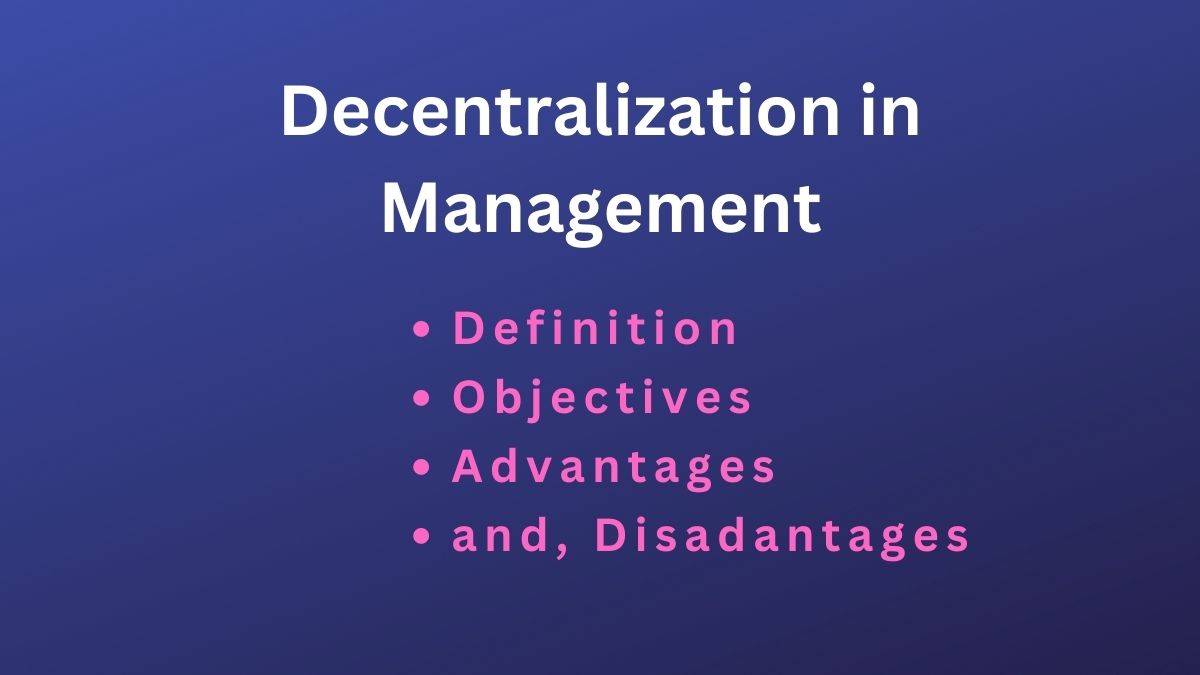What is Decentralization of Authority? Definition, Objectives, and Pros/Cons
What is Decentralization?
Decentralization is a management philosophy in which the authority is delegated to middle and lower-level management in accordance with their responsibility. In simple words, it is a process of assigning decision-making power as close as possible to the level where the work is to be done.
Decentralization of authority believes that an individual manager can not control and supervise activities of all levels. Because of overload, top managers may not make the right decisions at the right time which results in losing business opportunities.
Thus, the decentralized management concept emphasizes the top management should delegate the required degree of authority to the lower levels so that lower-level managers can make quick decisions independently and implement them. This facilitates employees to get a chance to show their skills and further develops their different professional skills like leadership, decision-making, problem-solving, etc.
The opposite of decentralization is centralization. In centralization, the decision-making power is only in the hands of top-level management. Whereas, in decentralization, the decision-making power is distributed among various middle and lower-level authorities.
The important thing to note in this is that the degree of decentralization is influenced by the nature of the organization, attitude to top-level management, responsibility vested on the lower level, availability of qualified & competent subordinates, business environment, the cost associated with decentralization process, etc. And, the top management should play the supervisory role.
What is the Objective of Decentralization of Authority?
The main objectives of decentralization of authority are mentioned below:
- To make organizational performance more transparent.
- Create accountability among different middle and lower authorities.
- To facilitate employees’ career development.
- To reduce the workload of top management.
- Increase employee motivation.
Advantages of Decentralization
An organization that follows the decentralized organizational structure will be enjoying the following benefits.
Quick Decision
As decision-making power is delegated to the unit managers where the choice needs to be implemented, a decentralized organization enables quicker and better decision-making. Functional managers’ decisions become more accurate, which promotes organizational expansion and diversification. In business, quick decisions are more crucial to grabbing possibilities.
Improved Communication
Because of the authority given to each level, employees at those levels become more accountable. This reduces the amount of time it takes for information to be transmitted to various levels, where it is crucial.
This model makes it easier for two-way communication, which improves relationships between managers and subordinates.
Employee Morale and Motivation
Middle-level and lower-level managers are encouraged to exercise free and independent decision-making power thanks to decentralization. They get knowledge about how to make judgments in various circumstances, which improves their competence, commitment, and creativity. This leads to high morale and motivation among employees.
Related: 12 Tips To Motivate Employees
Reduces Workload
It also reduces the excessive workload of top managers. They can be free from routine jobs. As such, the top managers have enough time to concentrate on strategic issues. It helps to adopt environmental changes and change management.
Growth and Diversification
As functional managers make decisions specific to their functional domains, a decentralized organization improves specialization at the decision-making level.
Functional efficiency results from functional managers making more effective judgments. It makes it easier for businesses, markets, and activities to expand and diversify. Additionally, it aids in network and profit center expansion.
Environmental Adaptation
The business environment is dynamic which adds complexities to decision-makers. In such situations, top managers must be involved in strategic formulation. Decentralization facilitates authority to middle-level and lower-level managers for routine jobs.
This facilitates top-level managers to concentrate on adapting the new technology and business practices. It helps to adapt to environmental adaptation.
Disadvantages of Decentralization
Decentralization is not suitable for all organizations. It is necessary to consider the level of employees who have to use authority.
Related: Centralization and Decentralization Principle
Unnecessary decentralization sometimes creates problems in the organization. As such, despite many advantages, the decentralization of authority is not suitable for the following reasons.
High Cost
In a decentralized organization, managers and supervisors must be more trustworthy since they must execute authority using their judgments. Such a company needs workers at every level who are well-trained, experienced, and skilled.
Such employees are expensive because they need expensive financial and non-financial benefits. It lowers profitability by raising administrative and operating costs.
No Uniformity in Direction
As decisions are made at the level of operation, different people with different interests, experiences, skills, and analytical capacities can make the decision according to their wishes. Such decisions may not be uniform. This causes a decrease in coordination.
Related: Directing in Management
Potential of Conflict
Under this structure, each subordinate manager is pressured to increase the output of their level. Each department manager emphasizes increasing the output of their own departments instead of the overall organizational level. This may increase departmental conflict.
There May Be Poor Communication
Decentralization allows for the creation of departments at various locations based on their convenience. Departments don’t consider the importance of other departments because they are autonomous in their decision-making.
For job output, each department may have its own standards and practices. This makes it difficult to have effective communication.
Greater Risk
At various levels, subordinates make decisions based on what is necessary for the department. It’s possible that not every decision-maker is equally capable and devoted to making the best choices. Low confidence, experience, or skills can lead to poor decisions, which can increase the likelihood of failure.
Chance of Misuse of Authority
Departmental and unit managers are autonomous to make decisions for their departments and units. There is poor control of central-level management over the acts of departments. Departmental managers may misuse their authority which can create serious problems in the organization.
Read Next: Centralization Vs. Decentralization of Authority
Sajan Kushmi is a content writer with more than 4 years of experience. He holds BIM Degree. He write on the topics related to Management, Marketing, and Entrepreneurship.






